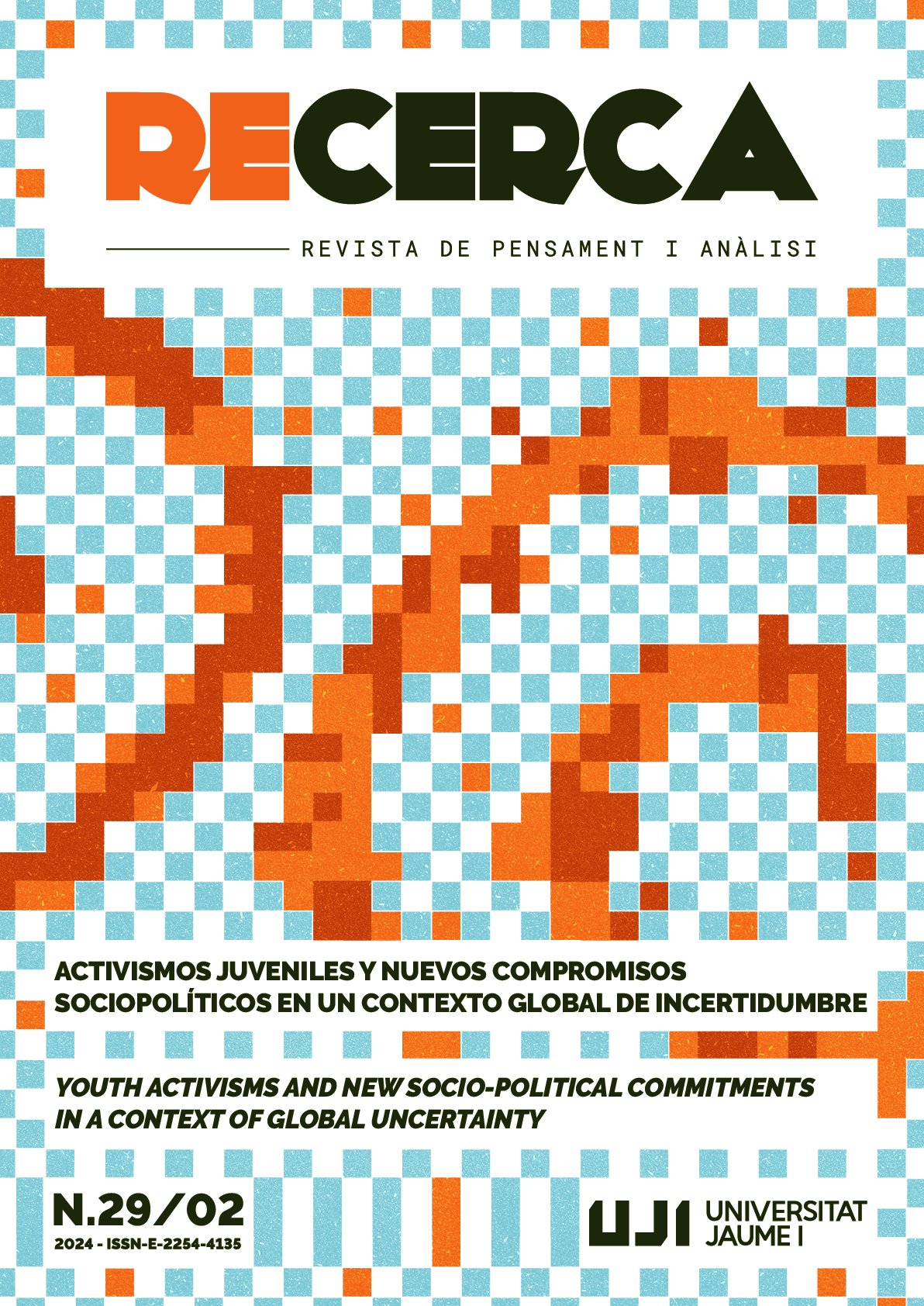And what happens on the other side? An approach to civic-constitutional student organizations in Spain
Main Article Content
Abstract
In this article, we approach how various student associations that have emerged in recent years in Spain have been activating the socio-political participation of young people in the sphere of civic constitutionalism. Using qualitative interviews and participant observation, we document the diversity and territorial presence of these associations. We delve into their ideology and the cluster of activities and action strategies they employ. One notable aspect is their ability to deploy frames of meaning that compete with and/or complement other forms of activism, discourses, and political demands common among alternative social movements and those advocating for social justice. For example, how they understand democratic institutions and university coexistence, the role of educative institutions in their formative development, or issues of strong public controversy.
Downloads
Article Details
Funding data
-
Agencia Estatal de Investigación http://dx.doi.org/10.13039/501100011033
Grant numbers AEI/10.13039/501100011033 (PID2020-117529RB-I00)
References
Alexander, Jeffrey y Díez García, Rubén (2021). Epílogo. A propósito de ‘Frontlash/Backlash: The Crisis of Solidarity and the Threat to Civil Institutions’, de Jeffrey Alexander. En defensa de la democracia liberal: la superposición del binomio “acción-reacción”. Política y Sociedad, 58(2), e74514. doi: https://doi.org/10.5209/poso.74514
Beck, Ulrich (1992). Risk Society. Towards a New Modernity. London: Sage.
Beck, Ulrich (1997). La reinvención de la política: hacia una teoría de la modernización reflexiva. En Beck, Ulrich, Giddens, Anthony y Lash, Scott (comp.). Modernización reflexiva. Política, tradición y estética en el orden social moderno. Madrid: Alianza.
Bell, Daniel (1967). The cultural contradictions of capitalism. New York: Basic Books Inc.
Benedicto, Jorge (dir.) (2017). Informe Juventud en España 2016. Madrid: INJUVE.
Benedicto, Jorge y Ramos, María (2018). Young people’s critical politicization in Spain in the great recession: A generational reconfiguration? Societies, 8(3). doi: https://doi.org/10.3390/SOC8030089
Braungart, Richard G. (1984). Historical generations and generation units: a global pattern of youth movements. Journal of Political & Military Sociology, 12(1): 113-135.
Díez García, Rubén (2023). Why Spain’s democratic transition continues to shape its politics. EUROPP - European Politics and Policy. Recuperado de: https://blogs.lse.ac.uk/europpblog/2023/08/14/why-spains-democratic-transition-continues-to-shape-its-politics [Consultado el 15 de julio de 2024].
Díez García, Rubén (2024). La relación entre movimientos y partidos. Un arma de doble filo. SocArXiv. doi: https://doi.org/10.31235/osf.io/auf9s
Díez García, Rubén y Laraña, Enrique (2017). Democracia, dignidad y movimientos sociales. Madrid: CIS.
Díez García, Rubén y Sribman, Ariel (2024). How Did the Pandemic Shape the Dynamics of Two Civic Communities? Unraveling Complementarities and Divergences Within Spain's Civic Culture, in S. Maddanu, E. Toscano, Inequalities, Youth, Democracy and the Pandemic. London: Routledge. doi: https://doi.org/10.4324/9781003459682-16
Flacks, Richard (1971). Youth and social change. Chicago: Markham Publising Company.
Furlong, Andy (2013). Youth Studies. An introduction. London: Routledge.
Giddens, Anthony (1991). The consequences of modernity. Cambridge: Polity Press.
Gil Calvo, Enrique (2001). Identidades complejas y cambio biográfico. En del Campo Urbano, Salustiano (hom.). Estructura y cambio social: homenaje a Salustiano del Campo (151-158). Madrid: CIS.
Gil Calvo, Enrique (2002). Emancipación tardía y estrategia familiar. El caso de los hijos que ni se casan ni se van de casa. Revista de Estudios de Juventud, 58: 1-9.
Haidt, Jonathan y Lukianoff, Greg (2019). La transformación de la mente moderna. Cómo las buenas intenciones y las malas ideas están condenando a una generación al fracaso. Barcelona: Deusto.
Laraña, Enrique (1982). La juventud contemporánea y el conflicto intergeneracional. Revista de Juventud, 3: 41-62.
Laraña, Enrique (1994). Continuity and Unity in New Forms of Collective Action: A Comparative Analysis of Student Movements. En Laraña, Enrique, Johnston, Hank y Gusfield, Joseph (eds.). New Social Movements. From ideology to Identity. Philadelphia: Temple University Press. Disponible en español: Laraña, Enrique y Gusfield, Joseph (eds.). Los nuevos movimientos sociales. De la ideología a la identidad. Madrid: CIS.
Laraña, Enrique (1999). La construcción de los movimientos sociales. Madrid: Alianza.
Mannheim, Karl (1954). Ideology and utopia. London: Routledge & Kegan Paul LTD.
Melucci, Alberto (1989). Nomads of the Present. Philadelphia: Temple University Press.
Melucci, Alaberto (1995). The process of collective identity. En Klandermans, Bert y Johnston, Hank (eds.). Social Movements and Culture. Minneapolis: University of Minnesota Press.
Olivas-Osuna, José Javier, Arias-Maldonado, Manuel y Barrio, Astrid (2022). El populismo de Vox y Podemos: análisis multidimensional de dos evoluciones divergentes. En Fernández-García, Belén y Valencia Sáiz, Ángel (eds.). En los márgenes de la democracia liberal: Populismo, nacionalismo y radicalismo ideológico en Europa. Granada: Comares.
Pluckrose, Helen y Lindsay, James (2020). Cynical Theories: How Activist Scholarship Made Everything about Race, Gender, and Identity –and Why This Harms Everybody. North Carolina: Pitchstone Publishing.
Polleta, Francesca (2006). Mobilization forum: awkward movements. Mobilization: An International Journal, 11(4): 475-478.
Rama, Jose, Zanotti, Lisa, Turnbull-Dugarte, Stuart J. y Santana, Andrés (2021). VOX. The rise of the Spanish populist radical right. London: Routledge.
Snow, David (2006). Are there really awkward movements or only awkward research relationships? Mobilization: An International Journal, 11(4): 495-500.
Snow, David, Burke, Rochford, Worden, Steven y Benford, Robert (1986). Frame alignment processes, micromobilization, and movement participation. American Sociological Review, 51: 464-481.
Tejerina, Benjamín (2005). La movilización social: de la cultura política a la cultura de la política. En CEIC. Hacia una nueva cultura de la identidad y de la política. Tendencias en la juventud vasca. Vitoria-Gasteiz: Servicio Central de Publicaciones del Gobierno Vasco.
Turner, Ralph (1969). The Theme of Contemporary Social Movements. British Journal of Sociology, 20, 390-405.
Turner, Ralph (1994). Ideology and Utopia After Socialism. En Laraña, Enrique, Johnston, Hank y Gusfield, Joseph (eds.). New Social Movements. From ideology to Identity. Philadelphia: Temple University Press. Disponible en español: Laraña, Enrique y Gusfield, Joseph (eds.). Los nuevos movimientos sociales. De la ideología a la identidad. Madrid: CIS.


